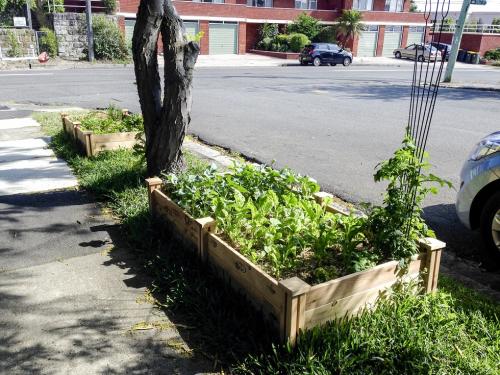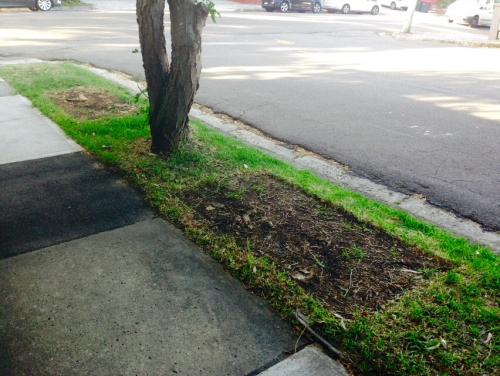When it comes to council complaints, where’s due process?
Here’s a little story about two planter boxes on a footpath, one complaint and the reaction of Randwick council. Russ Grayson says it’s time to bring due process, fairness and democracy to local government.
They were there one day and gone the next. Two neat little raised planters on the Randwick footpath planted out with a thriving crop of flowers and vegetables. A small thing you might say, their removal, but more of a big thing when it comes to council due process, fairness, citizen initiative and democracy.
The story is this: a family household took the initiative to build, plant out and tend those two little planter boxes on a footpath disused other than to grow a monoculture of grass. Someone on the street complained to council, claiming they were a ‘land grab’. Council ordered their removal. Now, two patches or bare soil is all that remains of that citizen’s initiative in urban beautification.
The garden presented no hazard to pedestrians or to people disembarking their vehicles, being offset from the kerb. They featured a variety of flowering, herb and vegetable species and presented a far more interesting element to the streetscape than mere lawn. The gardens were well regarded by people living nearby, according to one informant, except for the single person who complained. And there resides the problem.
HOW THE VEXATIOUS LIMIT OPPORTUNITY
The problem is this. Randwick Council, and most other councils that I know of, allow what happens on public land to be determined by a tiny minority of vexatious people.
All it takes is a complaint. Council acts, and the cause of the complaint is removed by order. There is no process by which the order can be appealed as the council staff, usually a ranger, sets a narrow time limit for the removal of the object that is the focus of the complaint. In the big picture this is council managerialism at work, even an authoritarianism, because it ignores processes of democracy. Council manages public space and citizens have little or no say, unless that is, you are one of those vexatious people who influence what happens by complaining about others. In the rhetoric about openness and participation that some councils go on about, this represents a lack of due process. It also allows vexatious people to set council policy in a de facto way.
I had encountered this before, when I worked in local government. The same thing happened. Local people wanted to make a food garden and create a sense of community on an area of poorly-used parkland. A vocal local and a couple of her friends complained to council and harassed the gardeners and their children. That council had the common sense to realise that this was a squeaky wheel speaking (a council term for the one or small number of noisy objectors usually of the NIMBY— Not In My Back Yard—variety) and the garden is still there today, a new option in urban recreation for local people.
You can only wonder why other councils discourage citizen initiatives such as the demolished footpath garden.
Council expects citizens to take responsibility for footpaths. Why, when the household in question took responsibility creatively, did council order their footpath garden destroyed? It’s because council ideas on householders maintaining the footpath outside their properties stops at lawn mowing. Yes, people provide a free lawn mowing service for council.
Sometimes, councils have a policy on footpath gardening through which citizens can garden their footpaths. In many cases these are overly bureaucratic for such a small initiative. Some even want to see a plan. A similar case took place in the Waverley local government area a couple years ago when council ordered a footpath garden to be removed because someone complained. That garden pre-dated council’s footpath garden policy by years. Apparently, councils choose to let a single complainant determine what could and could not happen on public footpaths. Seems they can backdate policy when it suits them.
AND SO TO SUSTAINABILITY
You might also ask how Randwick Council’s ordering the removal of the garden sits with its claim to practice sustainability. If council is to retain any credibility in this, why order that a biodiverse garden is destroyed and replaced by lawn monoculture that consumes water and oil energy in its maintenance? A little inconsistency here, perhaps?
It goes beyond gardens on footpaths, however. A few years ago we had the unfortunate and, for Waverley Council I think it was, humiliating-for-council case of their ordering the removal of a children’s cubby house in a private garden because the householder had not sought building approval.
JUST A LITTLE IRONY
Back to that Randwick footpath. There’s a little irony here. If you walk along the footpath past the bare patches where the two gardens beds were forcibly removed by council, what do you come to? Nothing more than two raised footpath gardens outside the adjacent property. Did council force their removal? No. They are still there.
Presumably, council received no complaint about these so took no action. It’s pretty obvious that forcing the removal of the two gardens while ignoring the others makes council look… let’s say that it makes it look a bit inconsistent… and silly.
Why, when other local governments like City of Sydney make it straightforward for citizens to make productive use of footpaths through responsible footpath gardening, does the City of Randwick lack such an easy, non-bureaucratic, cost-free approach to civic beautification, urban food production and improvement to the urban environment?
It is time to bring due process, fairness and democracy to local government. In situations where a complaint is received about anything at all, in a democratic society it should be incumbent on local government to institute a no-fee process for a hearing during which the person receiving the complaint can be heard so as to defend their work and for the complainant to be identified and put their case. Government secrecy in not disclosing the identity of a complainant is a misfit when it comes to dealing with complaints. Anonymity should not be an option. Council openness should. The right to defence is a legal right in other jurisdictions. So should it be with local government.
Oh, yes… did I say that if you walk further along the street you see even more footpath gardens?
Read more on gardening the urban footpath here.
Before the removal….

… and after…

Russ Grayson is an online and photojournalist reporting on food systems, community initiatives and technology and society. A media contact for the Australian City Farm & Community Gardens Network, Russ has worked in international development in the South West Pacific, local government and urban agriculture.















Brian Parkin
January 25, 2015 at 10:40 pm
Councils and Due Process
Thanks, Russ. I too used to work for local government and so have a better than average experience of council inconsistencies. Here's an example in Brisbane. A resident in a northern suburb was fed up of people parking across their driveway. They complained and a few days later, the road gang appeared and painted a continuous line on the road, just for this resident's property though! It looked ludicrous to see the street with one yellow line outside the driveway of only one house.
frank6th
February 7, 2015 at 1:23 am
Council complaint
If all people where fair and reasonable we would live in a perfect world, but they are not and we don't! Just look at the Palestinian West Bank to see how crazy the use of land can get. I'm with the council on this because if they don't take action pretty soon there would be people using that as an example to push the boundaries further and further, until you get into the situation of having to ask their permission to move their stuff so you can move along what is suppose to be public land, sounds just like the West Bank!
Cols say
May 27, 2016 at 3:15 pm
Who is making the decisions
I often wonder how qualified the people are in council who make such decisions. I am currently delayed in building our home due to a decision made by council on our plans based purely on opinion where there are no hard and fast rules. This decision is delaying our home starting costing us due to delays and we have to pay fees to help them justify their opinion. To make it worse I find that the person making this decision was still in high school 4.5 years ago, throw in UNI after that and there’s not a lot of relevant life experience to be making decisions based on opinion that affect people’s lives.